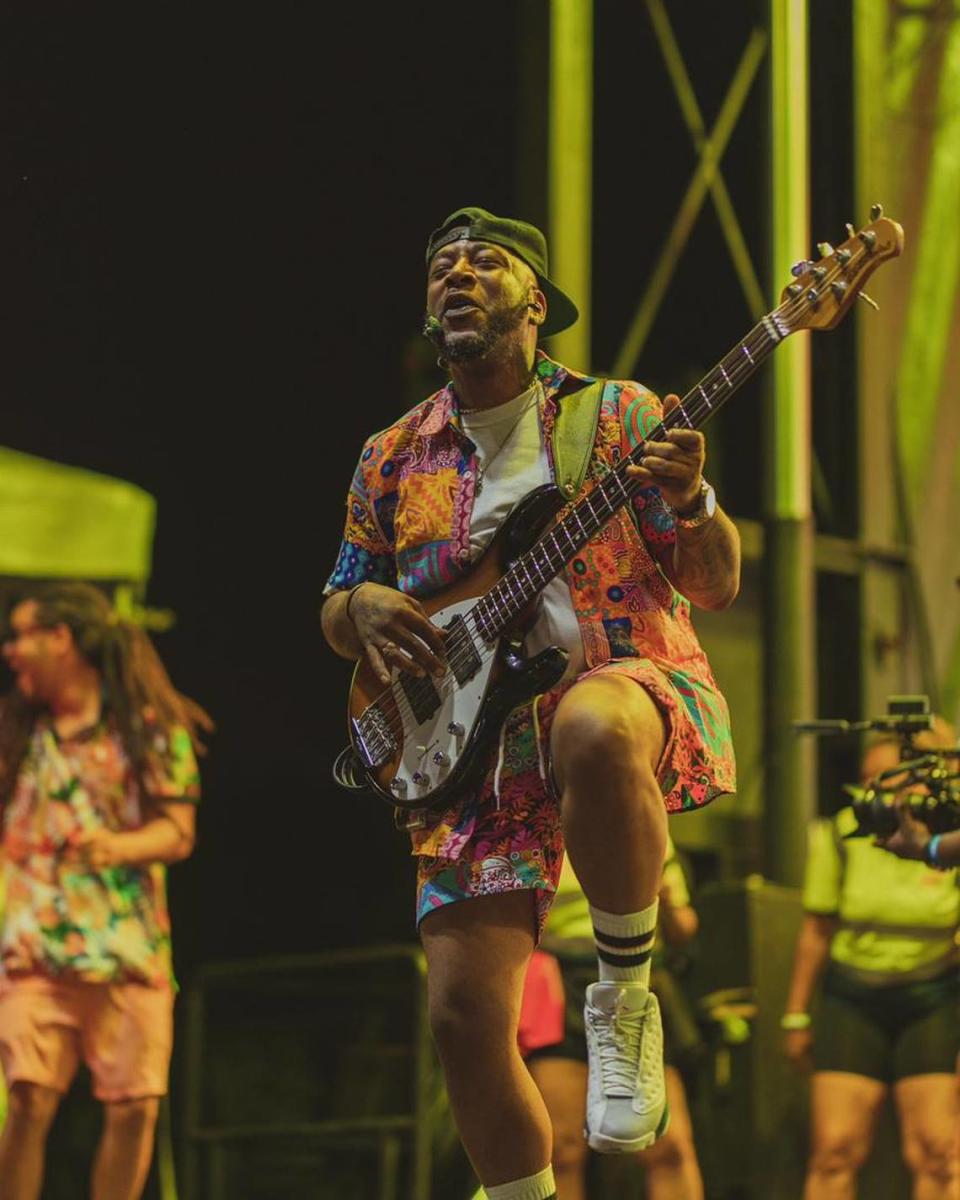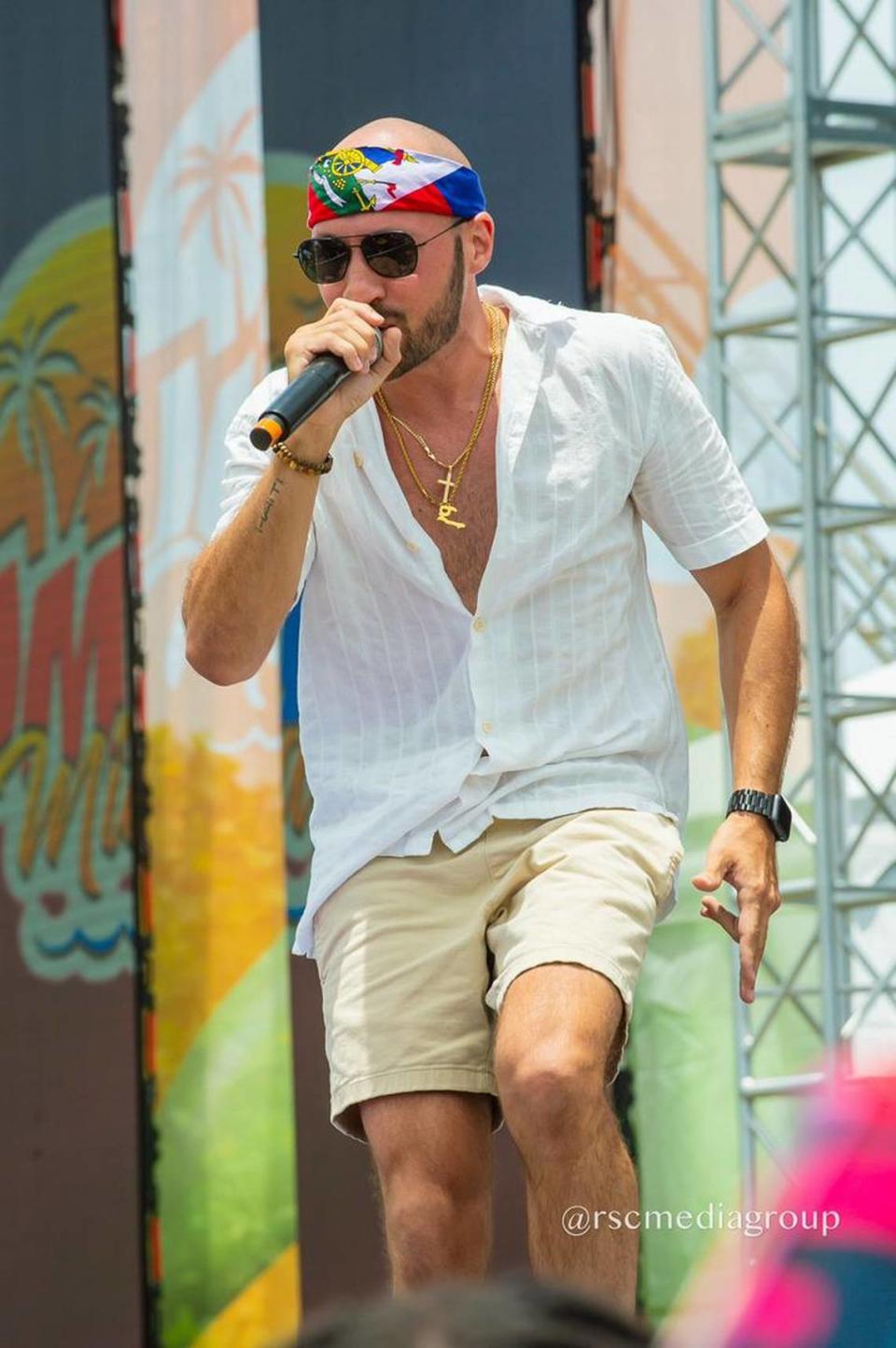Are Haitian artists being forced to perform for gangs? Recent arrest triggers debate
The recent arrest of a young Haitian rapper and his crew on a Port-au-Prince street on allegations they were en route to shoot a music video inside a notorious gang-controlled kidnapping lair is igniting debate over culpability and moral responsibility in a country overrun by gangs.
The debate is a familiar one in the United States, where the popularity of hip-hop, and more specifically gangsta rap, has long ignited conversations about the relationship between music and violence, and the role artists play in glorifying the latter. But in Haiti, where surging violence and kidnappings by armed gangs appears to know no boundaries, it’s a nascent one that’s gaining traction as DJs, rap and konpa artists find themselves in the middle of a moral and ethical debate about the rise of the country’s gangs.
“As artists we are always reflecting among ourselves, saying, ‘We don’t know what to do,’” said Izolan, a well-known rapper and lyricist who rose to fame as a member of the Rap Kreyòl group Barikad Crew. “Because today, we are under a lot of pressure.”
Bourik The Latalay, whose real name is Wilkinson Kernizan, and five of his friends were arrested on July 25th by Haitian police while en route to a video shoot. Police said the video shoot was going to take place in Village de Dieu, the Port-au-Prince slum and kidnapping lair run by gang leader Izo, who fancies himself a rapper. Police said that members of the public had accused Kernizan and his comrades of being active members of Izo’s gang.
“According to information provided to the police by certain citizens, they often frequent the Village and are full members of said gang,” a police statement said. The Haiti National Police also noted that in the days before and after the group’s arrest, “there were a lot of festivities” inside Village de Dieu, attracting many artists, including DJs.
On Wednesday, the six young men were finally released after being detained for nearly 15 days inside a Port-au-Prince police substation. Their freedom came after a hearing before deputy government prosecutor, Jean Claude Jean Antoine, who did not file any charges.
Still, the incident is raising discussions about the intersection of gangsters and artists in Haiti, where the tightening grip of gangs has forced many popular Haitian music acts, based in Miami and New York, to forgo their once lucrative summer tours in their troubled homeland, and Haiti-based promoters to relocate festivals outside of the country.

In a country where artists have long been a major influence in pacifying a volatile landscape and in political campaigns — often riding their popularity to become elected as senators, congressmen and even president — the performers now find themselves faced with a dilemma: Either you perform for kidnapping gangs and face criticism, or you risk putting yourself, your family, and every member of the band in jeopardy by not performing.
And of course there is the police, struggling to provide law and order in what has become an uncertain, gang-controlled land where everyone is trying to survive as heavily armed groups control 80% of the capital.
During an interview with Radio Caraibes on Thursday, the day after his release, Bourik The Latalay, 23, whose name loosely translates in English to “The Savage Jackass,” said he was asked by police during his detention if he had ever performed in Village de Dieu.
“Once,” he said.
“As soon as they call and say they want you, they hang up the phone,” he said, referring to gang leaders who have had musicians and DJs play for their birthdays and to keep the population in the slum entertained.
He noted that he isn’t the only artist who has played for a gang chief, and in the new reality that is Haiti, one doesn’t have a choice.
“They tell you, you can die anywhere you are,” he said.
“You can put them off, once or maybe twice”
Bourik The Latalay’s music is akin to drill or trap, a genre of rap that some critics say promotes gang culture and is growing in popularity among Haiti’s urban youth. With often violent lyrics and videos to match, those who promote the music in Haiti have found themselves at odds with both critics and the police.
In September 2021 Haitian police were accused of gunning down 11 people in the Ravine Pintade neighborhood of Port-au-Prince during a video shoot. The shoot featured several artists and the use of guns, which a local human-rights group said were fake. There were unsubstantiated reports that Bourik The Latalay was among the artists present at the shoot, but was uninjured during the rampage.
Harry Luc, a promoter, said he understands the dilemma Haitian performers face.
“You can put them off, once or maybe twice,” he said of gang leaders. “But I think the artists you see going to perform are people who have already said no three, four, times and on the fifth request, they can no longer say no.”

Since 2017, Luc has promoted a widely popular summer festival in Haiti, SumFest. This year, he brought the show to Miami for the first time, staging it last month at the historic Virginia Key Beach Park, where it attracted some of the hottest bands on the Haitian music scene and about 10,000 music fans.
While he still promotes shows in Haiti, “because there are still people living there and they need entertainment,” the promoter acknowledges that it’s tough to stage events in the country due to the escalating violence.
“The violence is a handicap for the Haitian music market,” he said. “It’s not only affecting the artists, but it’s affecting the economy of the country.
“It doesn’t make any sense that you, as an artist, can’t decide where you’re supposed to go,” he added. “Because if you choose not to play for them as an artist, you know what might happen to you and there is nothing to stop it from happening.”
Local promoters and even artists say being involved in the music business in Haiti today is akin to walking through a ring of fire. They must maneuver a delicate balance between rebuking fans who are critical of artists performing for gangs and accusing them of normalizing their status and accepting kidnapping money, and the gangs themselves, who don’t believe in taking “No” for an answer.
Several Haitian artists provided examples of incidents in which people close to them were kidnapped, and along with negotiating their freedom by paying a ransom, they were also forced to play. Last year, a well-known singer even had his tour bus stopped, one recalled, and a musician was snatched because the gang wanted to see the singer.
Some analysts say those are excuses. While some artists may inaccurately be pinned as having gang associations, some do, human rights and law enforcement sources say, noting that some artists come from the very slums that armed groups now control and have refused to cut ties.
“We are fighting two battles,” said Akinson Belizaire, a prominent promoter. “There are the people on the social networks who are living outside of the country and not living the reality of the country. And there is the reality that at any point, you can be taken and made to pay for what you said you can’t do. We don’t have a choice.”
Belizaire said while promoters and mangers often employ their own tactics to avoid demands, like not answering calls from unknown numbers, nothing is foolproof.
“We are living in a time where you have no one to defend you; you can’t even be sure of the guy standing next to you,” he said.
Sometimes, the person on the other end making the demand knows the artist’s schedule better than those promoting shows.
“Everything boils down to security,” said the promoter, who is popularly known as Zagalo. “When a gang calls you, you have two choices: Either you leave the country or you accommodate them.”
Despite the pressures, Belizaire believes that artists can counter the narrative by coming together to “launch a battle to sensitize the public by calling for an end to kidnappings and to put down arms.”
“That way,” he said, “an artist can go play in the ghettos like they used to do.”
“We know we shouldn’t be playing for them”
When Bourik The Latalay and his crew were freed Wednesday, the rapper Izolan was among those waiting for them to walk out of the courthouse.
Born Jean Léonard Tout-Puissant, the artist, who has recorded with Haiti-born Grammy winner Wyclef Jean, criticized the arrest, saying that when police searched the vehicles, they found no weapons or anything to indicate gang affiliation. Further, the video shoot wasn’t even supposed to take place in Village de Dieu, but Carrefour Feuilles, another working-class neighborhood of the capital, Izolan said.
There is no law or even an advisory, Izolan said, from either police or the government that says musicians, DJs, or sound engineers cannot go perform in the gang-ridden slums.
“We would like for the government or for the police to issue a note that says they don’t want sound engineers, or artists to go play in the ghettos,” Izolan said. “That way as artists we will have something to say when we receive a call from the ghettos asking us to come perform.”
In an interview with the Miami Herald, Izolan acknowledged, that is still no guarantee.
“A lot of people say we shouldn’t go and play for the leaders of these areas. But if you decide not to do so, the only option you have left is to leave the country,” he said. “Can I leave and go live somewhere else and start over? I have a home here, I have a business, I don’t just live off my music. I have 3,000 people who work with me.”
Artists like himself who remain in Haiti are simply trying to survive with the new rules, he said.
“We know we shouldn’t be playing for” gangs, said Izolan, who runs a gambling business and has had several of his employees kidnapped. “When people hear that you are playing, they take to the Internet and they start criticizing you, calling you all kinds of names. But the majority of the people who are doing this, don’t live in the country. They are people in the diaspora… They have no idea under what pressure, threat you are having to perform.”
While Bourik The Latalay’s arrest raised his profile in and outside of Haiti, being associated with a gang in Haiti isn’t a positive.
In March, the Haitian actor Ralph Théodore, alias “Sexy,” was shot dead after being accused of having ties to the Village de Dieu gang and frequenting the infamous slum. His death remains unsolved.
“This is the situation we are living in, those of us who are artists,” Izolan said. “We will always be in a tight spot. When you call, the justice system can’t guarantee your security. ...There is a kind of pressure that you’re under, that not even the police can come to your rescue.”

